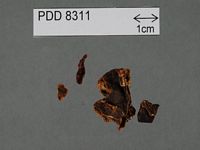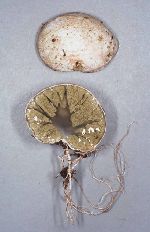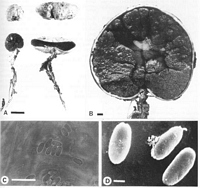|
 Protubera hautuensis Protubera hautuensis
SynonymsHysterangium hautu
BiostatusPresent in region - Indigenous. Endemic
Images (click to enlarge)
Caption: Dried type specimen
Owner: Herb PDD | 
Owner: Ross Beever | 
Caption: Fig.10 Protubera hautuensis. A, Basidiomata exterior and in section (PDD 52010). B,
Detail of basidioma in section (PDD 52010). C, Basidiospores by bright field (PDD
52010). D, Basidiospores by SEM (PDD 52010). Scale: 1 cm (A), 1 mm (B), 10 µm |
Article: Castellano, M.A.; Beever, R.E. (1994). Truffle-like Basidiomycotina of New Zealand: Gallacea, Hysterangium, Phallobata, and Protubera. New Zealand Journal of Botany 32(3): 305-328 (http://www.rsnz.org/publish/abstracts.php).
Description: Basidiomata up to 4 cm diam., globose to depressed, slightly ridged, white to bluish
white when fresh, bruising pale pink to pale grey red, especially on ridges, surface finely
tomentose, tomentum easily rubbing off upon handling; EtOH red to reddish brown.
Gleba gelatinous, pale olive grey to greyish olive; locules elongate, empty. Rhizomorph
stout, single, soon branching, up to 2 mm diam., concolorous with peridium, attached at
base. Columella distinct, dendroid, gelatinous, translucent. Taste not noted. Odour not
noted. Peridium fragile when dried, not easily separable from gleba, 450-750 dim thick,
2-layered; epicutis 200-400 µm thick, of hyaline, thin-walled, interwoven, inflated
hyphae, 5-60 µm diam., clamp connections absent; subcutis 250-350 µm thick, of
hyaline, interwoven hyphae, 2-4 µm diam., in a gelatinised matrix, clamp connections
absent. Sutures infrequent, of hyaline, interwoven hyphae, 2-5 µm diam., without clamp
connections, connecting some locules to epicutis. Trama up to 80 µm thick, of hyaline,
thin-walled, interwoven hyphae, 2-3 µm diam., in a gelatinised matrix, clamp
connections absent. Basidia not observed, "8 spored" (Cunningham). Spores
smooth, 4-5.5 x 1.5-2 gin, ellipsoid; apex obtuse, base obtuse; wall <0.5 µm thick. Utricle absent.
Spore colour in KOH hyaline to pale green singly, pale green in mass.
Habitat: Habitat: epigeous and buried amongst decaying leaves and white-rotted branches in
podocarp-broadleaf and Nothofagus forests. Season: February through October.
Distribution: New Zealand.
Notes: ETYMOLOGY: From Maori Hautu, the district where the type was collected.
REMARKS: Cunningham proposed the name Hysterangium hautu without a Latin
description after 1935, so it is a nomen nudum in accordance with Article 36.1 of the
Botanical Code. We validate the specific epithet, as hautuensis, in accordance with the
code recommendations on forming epithets from place names.
The occurrence of sutures through the gelatinised subcutis places this species in genus
Protubera. The combination of thin peridial layers, infrequent sutures, and peridium
colouring, especially upon handling, separates P. hautuensis from all other Protubera
species.
The record of H. hautu from Queensland by Cribb (1958) is erroneous and based on a
distinct, as yet unnamed, taxon.
Article: Cunningham, G.H. (1938). The Gasteromycetes of Australasia, XVIII. Transactions and Proceedings of the Royal Society of New Zealand 67(4): 408-410 Wellington:.
Description: Plants irregularly tuberiform, much shrunken and wrinkled when dry, fresh plants to 4
cm. diameter, drying to 2.5 cm., exterior clingy sage-green, brown where exposed, pallid
dingy create and dull below, attached by a prominent rooting strand. Peridium 300-400
microns thick, of an outer layer of pseudoparenchyma exteriorly coated with a delicate
fibrillose lacer of hyphae coated with crystals, and a thick inner layer of gelatinized
hyphae. Gleba olivaceous. cells irregular, 3-4 to mm, subglobose in fresh plants,
traversed by a branched columella; at maturity sometimes becoming gelatinized and
collapsing to a thin compressed layer tramal plates 50-75 microns thick, of gelatinized
hyphae; basidia 8-spored.. Spores elongate-elliptical, 4.5-5 x 1.5-2 microns, hyaline or
tinted, smooth.
|